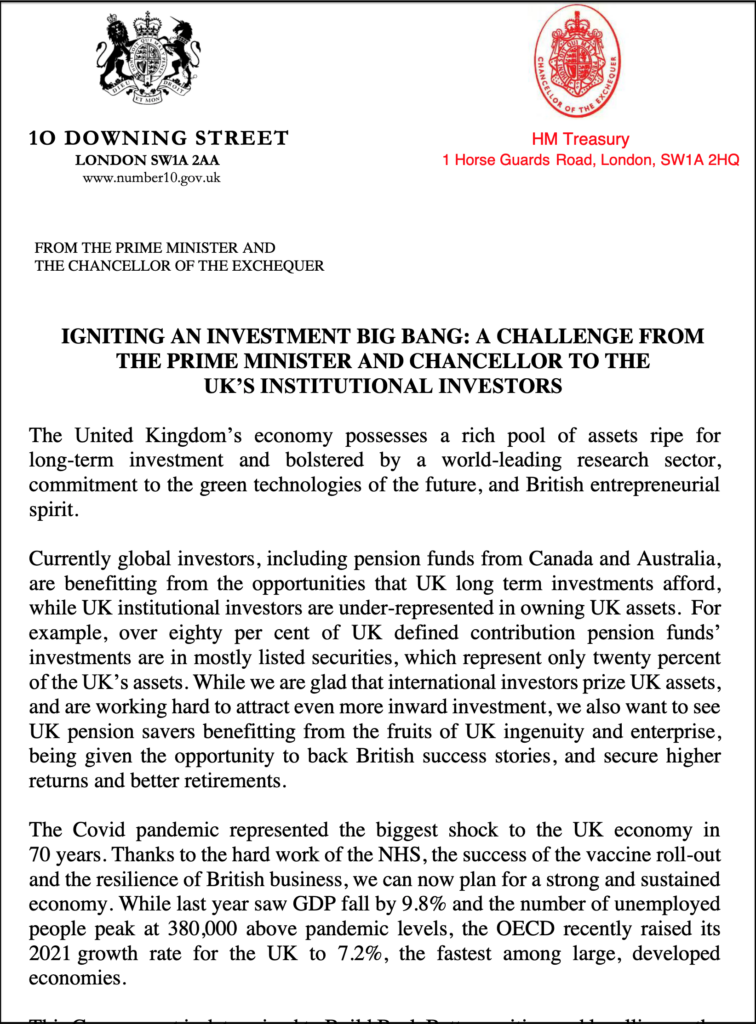
Boris Johnson and Rishi Sunak have written an open letter for financial institutions to use their capital to fuel an investment “Big Bang”. William Bourne argues LGPS could invest at home, but infrastructure investment in the UK may not be as attractive as the chancellor believes.
Over the summer the prime minister and chancellor issued a challenge for financial institutions to invest more in the UK. The LGPS was one of their targets, following former chancellor George Osborne’s 2015 characterisation of the pools as sovereign wealth funds who ought to put more money into infrastructure.
Should LGPS funds invest more in the UK? And, more specifically, should they help to finance the government’s infrastructure projects?
16th November 2021
Room151’s LGPS Investment Forum
London Stock Exchange
Speakers & Sponsors – LGPS Registration
Rishi Sunak’s argument is that foreign institutions invest, so UK counterparts should too. There are some more specious lines, such as his suggestion that returns are higher in the UK and, because listed securities only represent 20% of the UK’s assets, that is the appropriate asset allocation for defined contribution pension funds. But I will let those pass.
Responsibility
All pension funds’ first responsibility is to generate financial returns. The UK is attractive to foreign investors because of the relatively stable legal system and developed regulatory frameworks. That means lower risk, and UK trophy assets often go at higher prices, meaning reduced future returns. For example, investors in renewable energy have recently tended to favour more attractive valuations in mid-size countries and in Europe. That is exactly the assessment they are paid to make.
I find it perplexing that the Treasury wishes to use institutional capital to finance new
 infrastructure projects. As institutions expect a premium over the gilt yield to compensate for the construction risk, the cheapest and simplest way must be by issuing gilts backed by the government.
infrastructure projects. As institutions expect a premium over the gilt yield to compensate for the construction risk, the cheapest and simplest way must be by issuing gilts backed by the government.
To reduce public debt the project can always be sold on to private capital once the construction phase is complete. There may be some value from the private sector doing initial due diligence on a project, as the government’s record of project management and pricing is, ahem…, not unblemished. But this is an expensive way to achieve that.
Infrastructure generally is an attractive asset for LGPS funds, as it comprises real assets offering steady income, often with some linkage to inflation. Investing in the UK removes the currency risk too, and it is unsurprising that many funds are seeking to raise weightings from the current 4% average to 10% or more. If Sunak has more to finance in the future, there will be LGPS demand so long as the price is right. If foreign investors are prepared to pay a higher price, then he should accept the money gratefully.
Companies
I have much more sympathy with his call for long-term investment in British companies. Britain has, for a long time, been good at innovation and poor at bringing it to market. Private venture capital tends to focus on a limited range of sectors, and often does not like the level of risk involved in start-ups or early-stage investment. As just one example, the large drug companies prefer to pay more for a drug which has passed stage one clinical trials because that improves the likelihood of it coming to market significantly.
As a genuinely long-term investor, the LGPS is well placed to provide such capital. The barriers are largely about risk appetite, competency, resourcing, and conflicts of interest. Historically, most funds have not had the resources, or skillset, to undertake their own due diligence for this kind of investment. They, therefore, rely on expensive external advice.
As examples, two scheme managers I advise have made investments of this type, one the result of a legacy holding, the second a local initiative. The first solved the problem by partnering with BGF, a £2.5bn growth capital fund set up after the financial crisis to provide patient capital to SMEs within the UK and Ireland.
The second used two sets of consultants as well as extensive consultation with (two) independent advisers before committing money. In both cases the officer time involved was disproportionate to the value of the investment and neither way is genuinely scalable.
Pools
The pools represent the best way forward here, but their risk appetite is ultimately driven by the partner funds. The first step is, therefore, for committees and their advisers to recognise the opportunity in investing in UK innovation and instruct their pools accordingly.
Size is another problem. For a £40bn pool, an initial investment of £5m represents a tiny investment. Given the limited resources and skillsets, even at pool level, pools will need to partner with some of the third-party managers investing in this area. That could be by investing in some of the listed vehicles being set up to provide capital post Covid, or through private managers as part of their private equity portfolios. To avoid London bias, I suggest it is helpful if, like BGF, they have offices across the country.
To summarise, the LGPS will continue to invest where it believes it can get the best risk-adjusted returns. UK early-stage private equity probably is an underexploited opportunity. But UK infrastructure may not be as relatively attractive as Sunak would like us to believe.
William Bourne is principal of Linchpin Advisory Limited and has roles with five LGPS funds.
Boris Johnson and Rishi Sunak. Photo, Number 10, Flickr.
—————
FREE monthly newsletters
Subscribe to Room151 Newsletters
Room151 Linkedin Community
Join here
Monthly Online Treasury Briefing
Sign up here with a .gov.uk email address
Room151 Webinars
Visit the Room151 channel













